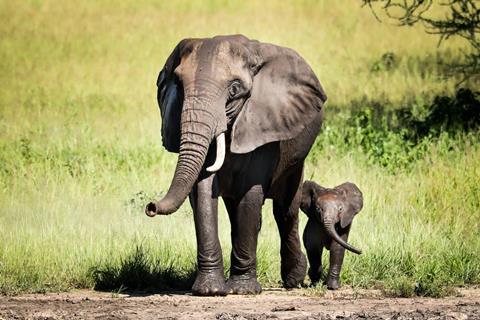In the fourth of our series on parenting styles Robin Barfield wonders whether Christian parents should be more like a tough love tiger or an affectionate elephant

King Solomon advised the sluggard to learn about hard work from watching an ant. What animal would he suggest a parent learn from? There are a number of choices and I wonder which species you might set as your role model. Perhaps you are like the tortoise – slow and patient with your children, compared to the hare who rushes them from task to task. Or perhaps you are like the eagle swooping over their heads, ready to plummet down to their level at any necessary moment. Or perhaps you are like the Mother Hen sheltering them under your wing, after all that’s a biblical picture (Luke 13:34).
The tiger parent is like an army sergeant fostering ‘tough love’ and seeking a competitive spirit in their children
As parenting styles have become more popular, one contrast that is often drawn is between the tiger and the elephant. The tiger parent is like an army sergeant fostering ‘tough love’ and seeking a competitive spirit in their children. I can sense this in myself, perhaps some of you can too; after all, I’m not very good at losing at family board games. But this approach can form an achievement oriented focus in a child which may undermine any assurance of acceptance and love. Identity becomes forged on winning at any cost. Like the tiger, ready to fight at any moment, the parent fills the child’s life with the correct activities in order for the maximum possible chance of success in life. This may be couched in terms of avoiding vice through busyness, it may even be stated as ‘giving them every possible opportunity’; but it may also be more about the parent living vicariously through their child as a result of their own failures.
At this point in walks the elephant. Or rather in trundles the elephant, ambling slowly with their calf by their side; keeping them close both physically and emotionally. This is a popular way of describing a parenting style which emphasises attachment, emotional stability and affection. There is some great wisdom here as it ties closely to recent research by Vern Bengtson which suggests that a warm relationship with the father is the most effective way of passing on the spiritual values from one generation to the next.
This is also an attractive picture. The reason you are reading this is most likely because you love and care for your children and you want them to be secure in their knowledge of your love for them as well as the Father’s love. This means this model is one we are naturally drawn to and want to learn from.
Read more:
What’s your parenting style? Are you a lawnmower?
What’s your parenting style? Are you a dry-clean parent?
What’s your parenting style? Are you a helicopter or a satellite parent?
The key contrast between these two models is the issue of priority, what really matters and what is valued in the family. In the first its worldly success and in the second its security and stability. I wonder how much, therefore, the elephant might be a reaction against the impact of family breakdown in our culture and the emotional disruption it can bring. This emphasis might be similarly responding to the distant parenting of our own upbringing where children were primarily seen as submissive. Instead the child is nurtured – tenderly cared for and listened to.
The criticism that the tiger parent might make at this point is that the elephant isn’t preparing the child for the challenges of the modern world – life can be pretty unforgiving at points. Chris Kiesling suggests that this model also has a danger of smothering the child and not allowing sufficient freedoms. If independent sleeping is restricted or delayed then the ability to function outside of the family circle may actually increase anxiety in the child. If the adult is following this route due to a sense of their own anxiety then that may be particularly true for anxiety is passed on from parent to child.
We want our children to know, feel and be secure in their emotional attachment to us, but if that attachment is based on our own anxiety and lack of security then that might be more harmful than we intend and may result in a crippling inability to leave the nest
Parenting is a guilt and anxiety inducing vocation and my purpose is not to make you feel guiltier about what you are already doing! It is to encourage us together to assess what our values are. We pick up a lot of parenting models and styles from the world around us which can have some really strong and good elements, but also will have some elements we want to critique or ask questions of. Elephant parenting is one of those.
We want our children to know, feel and be secure in their emotional attachment to us, but if that attachment is based on our own anxiety and lack of security then that might be more harmful than we intend and may result in a crippling inability to leave the nest. What are our motives and values then? This might take careful heart searching and conversation with trusted friends who can speak truth and point out our blind spots.
What other animals may make more suitable models for our parenting? Next time you’re at the zoo as a family why not seek the wisdom of King Solomon in learning from your observations of the animals there.


































